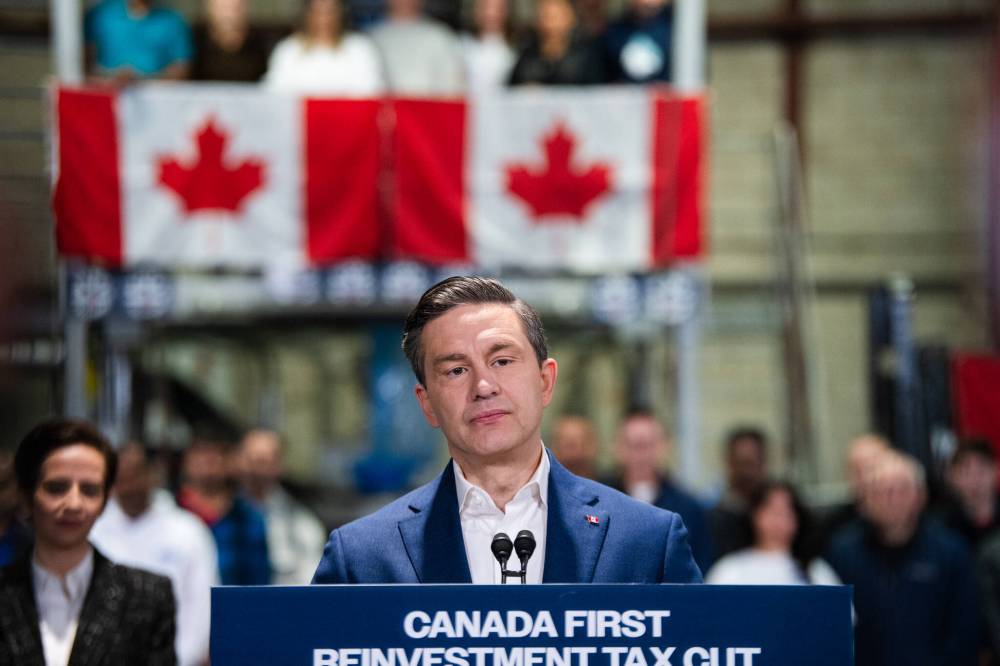Political leaders, according to New York Times columnist David Brooks, can be divided into “weavers” and “rippers;” weavers are consensus builders who bring people together, while rippers seek power by tearing things apart. As is obvious from his book’s title, Mark Bourrie’s Ripper: The Making of Pierre Poilievre clearly places Conservative Party leader Pierre Poilievre in the second category. And Bourrie is no fan.
Read this article for free: Already have an account? To continue reading, please subscribe: * To continue reading, please subscribe: *$1 will be added to your next bill. After your 4 weeks access is complete your rate will increase by $0.00 a X percent off the regular rate.

Political leaders, according to New York Times columnist David Brooks, can be divided into “weavers” and “rippers;” weavers are consensus builders who bring people together, while rippers seek power by tearing things apart. As is obvious from his book’s title, Mark Bourrie’s Ripper: The Making of Pierre Poilievre clearly places Conservative Party leader Pierre Poilievre in the second category. And Bourrie is no fan.
Read unlimited articles for free today: Already have an account? Political leaders, according to New York Times columnist David Brooks, can be divided into “weavers” and “rippers;” weavers are consensus builders who bring people together, while rippers seek power by tearing things apart. As is obvious from his book’s title, Mark Bourrie’s Ripper: The Making of Pierre Poilievre clearly places Conservative Party leader Pierre Poilievre in the second category. And Bourrie is no fan.
Bourrie, an Ottawa-based lawyer, historian and journalist, has 20 books to his name, publishing on topics ranging from the life of French explorer Pierre-Esprit Radisson to government media censorship during the Second World War. Now, with an exceptionally clear writing style, he has taken on the life and politics of Pierre Poilievre. In , Bourrie disparages almost everything connected to Poilievre, including Albertans and their anti-government individualist views.
“Alberta claims to have an entrepreneurial culture, but that’s a myth. The oil exists because of geology, not the skills and talents of Albertans,” he writes. Laura Proctor / Canadian Press files Pierre Poilievre, seen here on the campaign trail in Toronto on March 30, was first elected as an MP in 2004 in the Nepean-Carleton riding.
He became leader of the Conservative Party in 2022. Poilievre’s Alberta upbringing is interesting. Bourrie writes of his birth to a 16-year-old mother.
After his adoption by two middle-class schoolteachers, Poilievre’s birth mother became pregnant again, by another man, and his adoptive parents also took in this second baby, Poilievre’s half-sibling. Growing up in Calgary, Poilievre was heavily involved in high school wrestling until tendonitis in his shoulders forced him to quit. Seeking an outlet for his energy, his mother took him to a provincial Progressive Conservative Party gathering.
The boy was transfixed by the meeting’s energy. He never looked back, and at the age of 16 began reading such free market thinkers as Milton Friedman. Poilievre soon experienced the breakup of his adopted parents’ marriage.
It was an amicable separation and his father, Donald, subsequently entered into a long-term same-sex relationship. Both parents were present for Poilievre’s victory speech upon winning the Conservative Party leadership race in 2022. While still in high school, Poilievre campaigned for the provincial Progressive Conservatives and Preston Manning’s federal Reform Party.
It was at this time he caught the attention of Jason Kenney, a Reform MP, who brought him to Ottawa on an internship in 1999. Bourrie writes that Kenney was impressed by Poilievre’s “quick mind and thick skin.” In 2004, playing the young David to the giant Goliath, the 24-year-old transplanted Albertan ran as a candidate for the then-newly united Conservative Party of Canada, taking on David Pratt, a long-serving Liberal MP and cabinet minister in Nepean-Carleton — a federal riding lying on Ottawa’s suburban edge.
The young politician capitalized on such suburban issues as taxes and property crime. Duly elected in a tight race, Poilievre was now sitting with Stephen Harper and other Conservative MPs as the official Opposition. Local and national media came to rely on the always-available young politician to give clever anti-Liberal soundbites.
In the subsequent election in 2006, Poilievre was re-elected with 55 per cent of the vote and a margin of nearly 20,000 votes. Harper’s Conservatives were now in power and Poilievre was appointed to serve as parliamentary secretary to Treasury Board President John Baird. Bourrie writes that Poilievre’s propensity to speak to the media (described in the chapter titled ) led to a major clash with Harper.
On June 11, 2008, Prime Minister Harper rose in the House of Commons to give an apology on behalf of the country to First Nations for the trauma of the residential school system. It should have been a good day for the Conservative PM. Earlier that day, however, in the studios of a local news radio station, Poilievre questioned whether Canadians were “getting value for all this money” which was to compensate residential school survivors.
He went on to say that among First Nations “there is too much power concentrated in the hands of the leadership and it makes you wonder where all this money is going.” Summoned to the PM’s office the next day, Bourrie writes that staff could hear “muffled yelling through the thick door.” Shortly afterwards, Poilievre apologized in the House of Commons.
Ripper After the unsuccessful 2021 federal election, Conservative leader Erin O’Toole’s ousting by his own caucus led to Poilievre squaring off against Jean Charest for the party leadership. Charest was leader of what was then the Progressive Conservative Party of Canada following its 1993 electoral collapse, and had also served as premier of Quebec, as a Liberal. Bourrie describes Charest as a “weaver” rather than “ripper.
” The elder party statesman was no match for Poilievre’s take-no-prisoners campaign. On the first ballot, the younger politician won with 70 per cent of the vote. During Elections Get campaign news, insight, analysis and commentary delivered to your inbox during Canada's 2025 election.
Bourrie devotes entire chapters to important steps in Poilievre’s career, including a full chapter on his behaviour during the “Freedom Convoy” protests in the early months of 2022. This unpleasant episode brought downtown Ottawa to a standstill, triggering similar events in other parts of Canada. Never one to miss a good opportunity, Poilievre posted a YouTube video with him standing on an overpass with the convoy passing underneath, saying the protest was for “the people who want to stand and speak for their freedom” and ending with “truckers, not Trudeau.
” Knowing the federal election would come sooner rather than later, Bourrie’s publisher, Windsor-based Biblioasis, has rushed to print. Despite this, the work never seems rushed. It is lengthy and historically detailed while relying on media, secondary sources and parliamentary debates for many of the details.
will likely attract many readers — but with the title it bears, the bulk will likely be Liberals. Christopher Adams is an adjunct professor in the department of political studies at the University of Manitoba and co-editor of the upcoming The Keystone Province: Politics and Governance in Manitoba. Ripper: The Making of Pierre Poilievre By Mark Bourrie Biblioasis, 448 pages, $29 Advertisement Advertisement.
Entertainment

Reach for the top

Political leaders, according to New York Times columnist David Brooks, can be divided into “weavers” and “rippers;” weavers are consensus builders who bring people together, while rippers seek power by [...]














